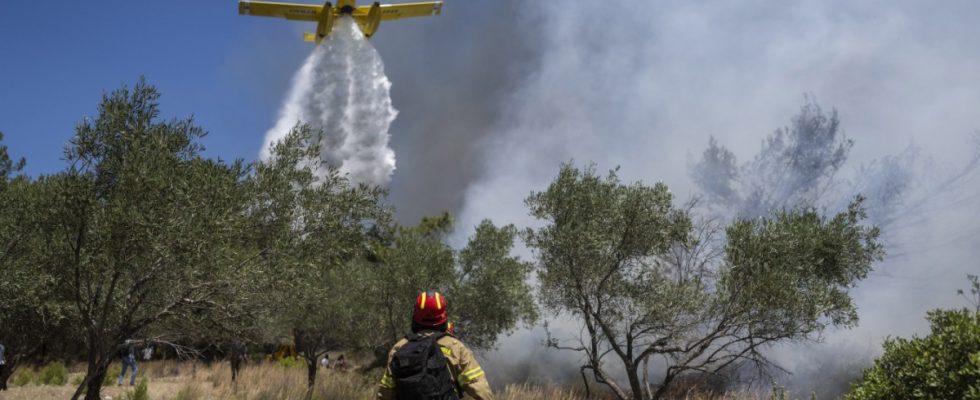A fire-fighting plane crashed while fighting the fires on the Greek island of Euboea, Greek state television reported on Tuesday. It was initially unclear whether the pilots survived the crash. More than 100 planes and helicopters have been deployed in numerous regions of Greece for days to extinguish the devastating fires. Greece is receiving support from firefighters from several EU countries. Turkey and Egypt have also sent firefighting planes and helicopters.
The situation in the southeast of the holiday island is particularly bad Rhodes. Strong winds blow there and fan the flames again and again. Six villages north and west of the ancient site of Lindos are under threat. “The extinguishing work is very difficult because of the turning winds,” said a spokesman for the fire brigade on state radio. Several houses on the island’s mountains burned down on Monday, state television reported. Reporters on the ground feared the fires could threaten hotel properties again. Recently, thousands of tourists and residents have been brought to safety.
Women have organized a food and drink collection point to feed helpers fighting the forest fires.
(Photo: Christoph Reichwein/dpa)
The damage on Rhodes is already great. Around ten percent of the island’s hotels were damaged over the weekend, according to Greek Prime Minister Kyriakos Mitsotakis. Most of the damaged facilities are located south of the Lindos region. Experts estimate that around 150 square kilometers of forest and agricultural land have been destroyed. Many animals are affected. The island too Euboea (Evia) north of Athens is ravaged by fires. The region of the small port town of Karystos is particularly affected. In the north of the island Corfu The village of Loutses was evacuated on Tuesday morning after the fire had intensified again due to the wind, according to the Greek fire brigade.
For Rhodes and large parts of the island Crete shouted the Greek civil defense the highest warning level “extreme fire hazard” for this Tuesday. The second highest (“very high risk of fire”) currently applies to the regions of Attica (with Athens), central Greece, Peloponnese, western Greece, the Ionian Islands, the Aegean island districts of Samos, Ikaria, Karpathos, Kalymnos and Kos, the regional districts of Larisa and Magnesia in Thessaly, and western Crete (regional district of Chania).
On the holiday island Corfu the fire brigade managed to contain a fire on Monday. About 1,000 tourists who had been taken to safety gradually returned to their hotels, as the local state regional broadcaster ERA-Corfu reported in the evening.
Other countries in the Mediterranean region are also struggling with heat and drought. In Algeria At least 34 people died in forest fires on Monday. About 8,000 rescuers were deployed to extinguish the fires. Among other things, they raged in the Algerian region of Beni Ksila east of the capital Algiers. Also the neighboring one Tunisia struggled with fires and temperatures up to 48 degrees Celsius on Monday. In forests near the Algerian border, firefighters battled fires that had been raging there for several days.
There was also a high risk at the beginning of the week France, Spain and Portugal. In Italy On the island of Sicily, Palermo Airport was temporarily closed until 11 a.m. due to a fire that has been surrounding the Sicilian capital since Monday. According to the Ansa news agency, there are also fires in other provinces of Sicily and in Campania in the forests above Amalfi and in Sardinia. In Calabria there were about 70 fires in a few hours.
Heat alert in southern Europe
The Mediterranean region has been hit by an extreme heat wave since last week. A record temperature of 47.6 degrees was measured in Sicily on Monday afternoon in the Syracuse region. Overheating of underground cables led to numerous power outages. The lack of electricity partly jeopardizes the water supply because pumps no longer work. On too Malta There were power outages, some of which lasted up to 36 hours. The World Health Organization (WHO) warned that the heat could be fatal to humans.
The Red Cross warned of the danger of old ammunition explosions in light of the heat wave and forest fires. In former war zones, the detonators of duds could be set off by very high temperatures, said Erik Tollefsen, weapons expert at the International Committee of the Red Cross (ICRC) in Geneva. The same applies to uncleared ammunition at military firing ranges and abandoned ammunition depots, which are often set up in remote areas, Tollefsen said.
It’s supposed to cool down soon, but the downwind “Livas” will come first
After all: In Greece, the provisional end of the heat wave is approaching – on Thursday. Strong winds are expected to cool down to 35 degrees Celsius. For twelve days, the thermometers in most regions of the country have been around 40 to 45 degrees. That will then be the longest heat wave, lasting more than two weeks, since there have been measurements in Greece, meteorologists said. Before the cooldown comes, there will be one final peak of heat.
Especially in the west of the country, a wind coming from Libya is expected for Tuesday and Wednesday: It is a hot, dry fall wind – the notorious one Livas. Meteorologists described the phenomenon as extremely dry and as hot as air from a hair dryer.

